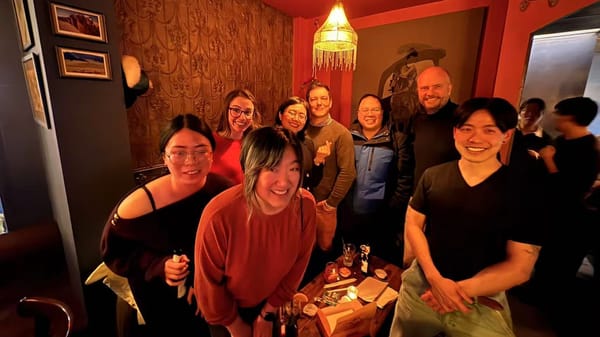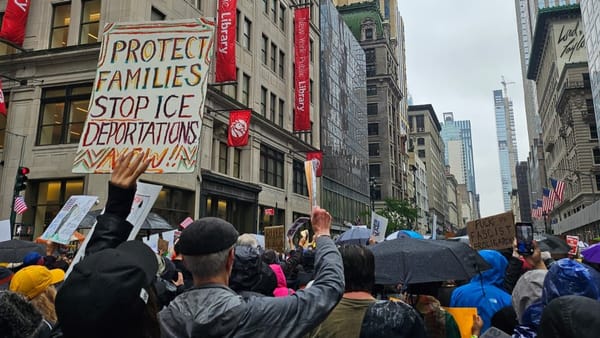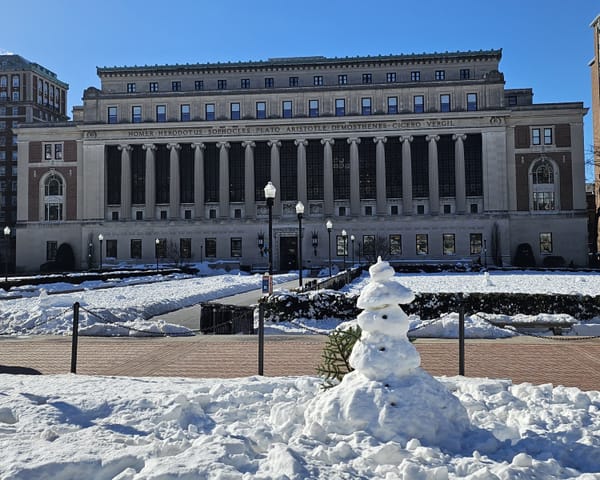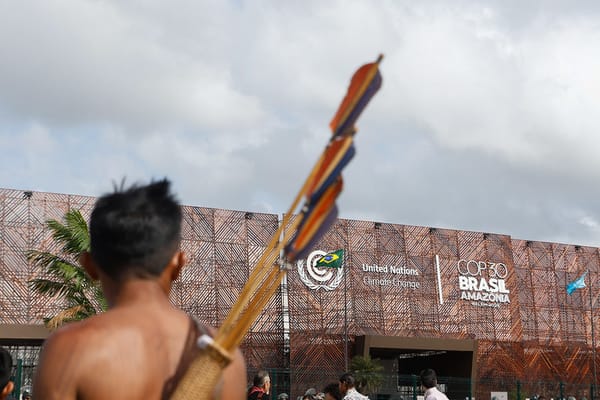10.1 | digesting new york climate week 2025
Basically, across eight days, I non-stop lived and breathed “Climate.”
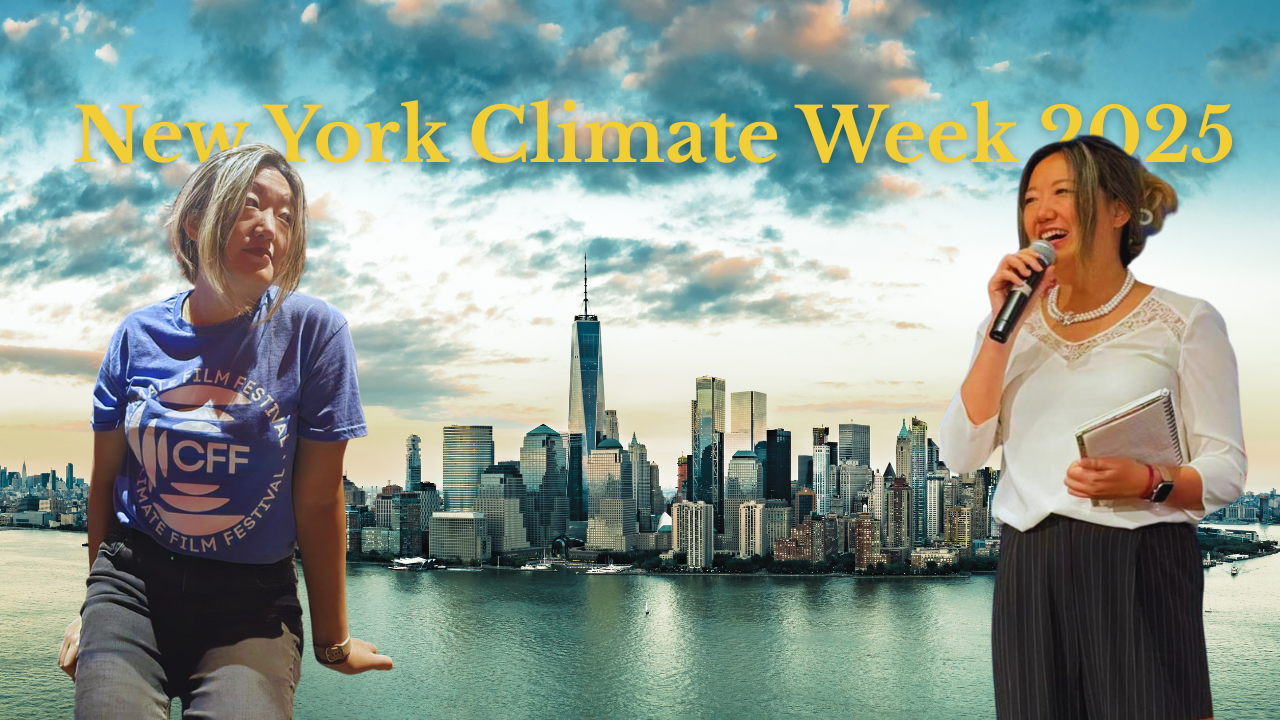
✉️ letter #67
Hi friends! I am emerging, somewhat, from a shockingly busy period, born from a congruence of oversubscribing to classes at the Climate School (I pulled out of two), a ton of social comms work needed for the lead up of a weekend event (The Climate Film Festival), and the start of another week-long, city-wide smorgasbord of happenings called Climate Week. Basically, across eight days, I non-stop lived and breathed “Climate.”
To make sense of it all, I figured I’d do a quickie run down of everything that I did.
🎼 the soundtrack | It's Been So Long - K.Flay
FRIDAY (9/19)
My Fridays now consist of a full day of classes, starting from 10:10 am and basically containing very small breaks until 4 pm. This includes two “discussions” back-to-back in the afternoons, which are basically slightly smaller lectures with a bit more audience participation. Usually a day like that is enough to fry the brain, but I went from the campus to my first true Climate Week event: the Opening Night ceremony and movie for the Climate Film Festival, a 25-year anniversary re-release of Erin Brockovich. It’s been probably 25 years since I’ve seen it, and… I did not remember it being two-and-a-half hours long. By the time the event was over and we’d made our way home, it was already nearing midnight.
I have little thoughts about the movie itself, except that my guy Scott, on the way back, commented, “Maybe the reason there’s been no huge environmental movie since is because we’re not allowed to put our heroes in push up bras, tiny skirts, and high heels anymore.” And I guess he has a point. Future conversations in the week touched on “mainstreaming climate” in popular culture, and truly, it seemed like nobody was willing to bring up how we might need a movie that’s just hot people solving climate justice issues hotly.
SATURDAY (9/20)
Late nights, early mornings! I made my way down to the LES for my first volunteer shift with the Climate Film Fest, at Essex Market for the workshop and panels. I’m glad I had the foresight to not sign up for full-day shifts - just being on-point all morning drained my battery, and I needed time to finish a half-dozen social media posts for the festival that were required for publishing during the weekend. I got the chance to actually pay attention to two panels—one by the NRDC’s ReWrite the Future program and one for pitching fiction ideas that touched on climate.
There were a lot of interesting ideas and I hope some of them get made into actual watchable programs, but none of them mentioned hot people, so again… ¯\_(ツ)_/¯. I want to think it’s because we’ve become more evolved than needing thirst traps to let us know something’s important, but it is also possible that we’re all just being polite and posturing, which is causing us all to be, in a roundabout way, just as conservative as the conservatives.
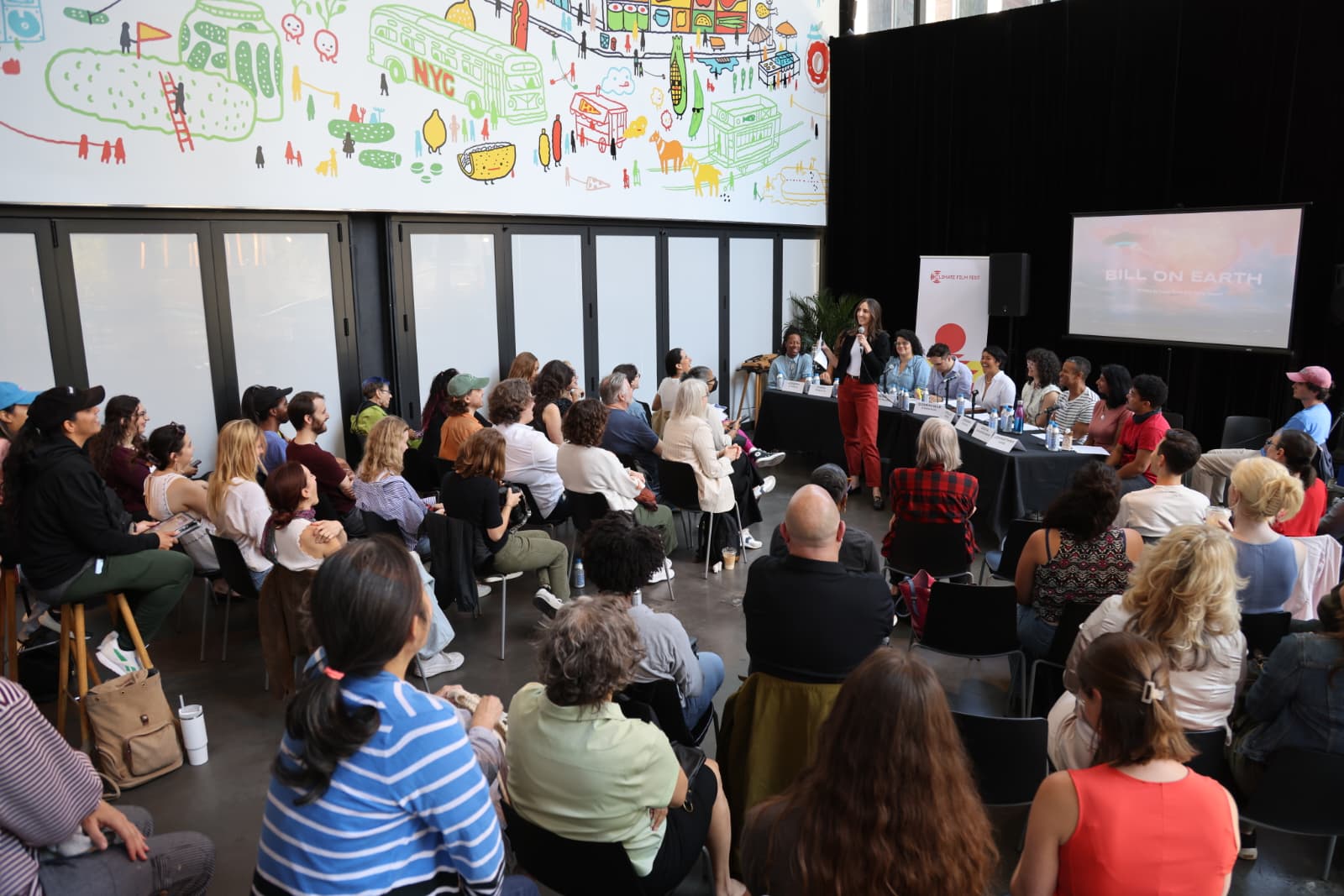
SUNDAY (9/21)
The second day of volunteering was at the cinema section of the Climate Film Fest, and as I was packing up, I realized that I’d gone through the whole event without actually seeing a single new climate movie. It turns out that when you’re volunteering in a capacity like mine (marketing), you’ve got so many other tasks that there is no time to watch anything. I can tell you the plots of just about every program that graced our forum these few days, but if you ask me what I thought about the actual beauty of what was presented, I’d give you the Gen Z stare.
I got a quick nap in before heading to the Closing Ceremony, near Chinatown, which was a blast. At one point, one director came on stage to thank us all and express how shocked that something this well run was done entirely by volunteers, and I’ll admit, I got a little verklempt. Whether or not I get to see a film (I mean, I hope I do, but my schedule been unforgiving), I was really proud to be a part of this project.
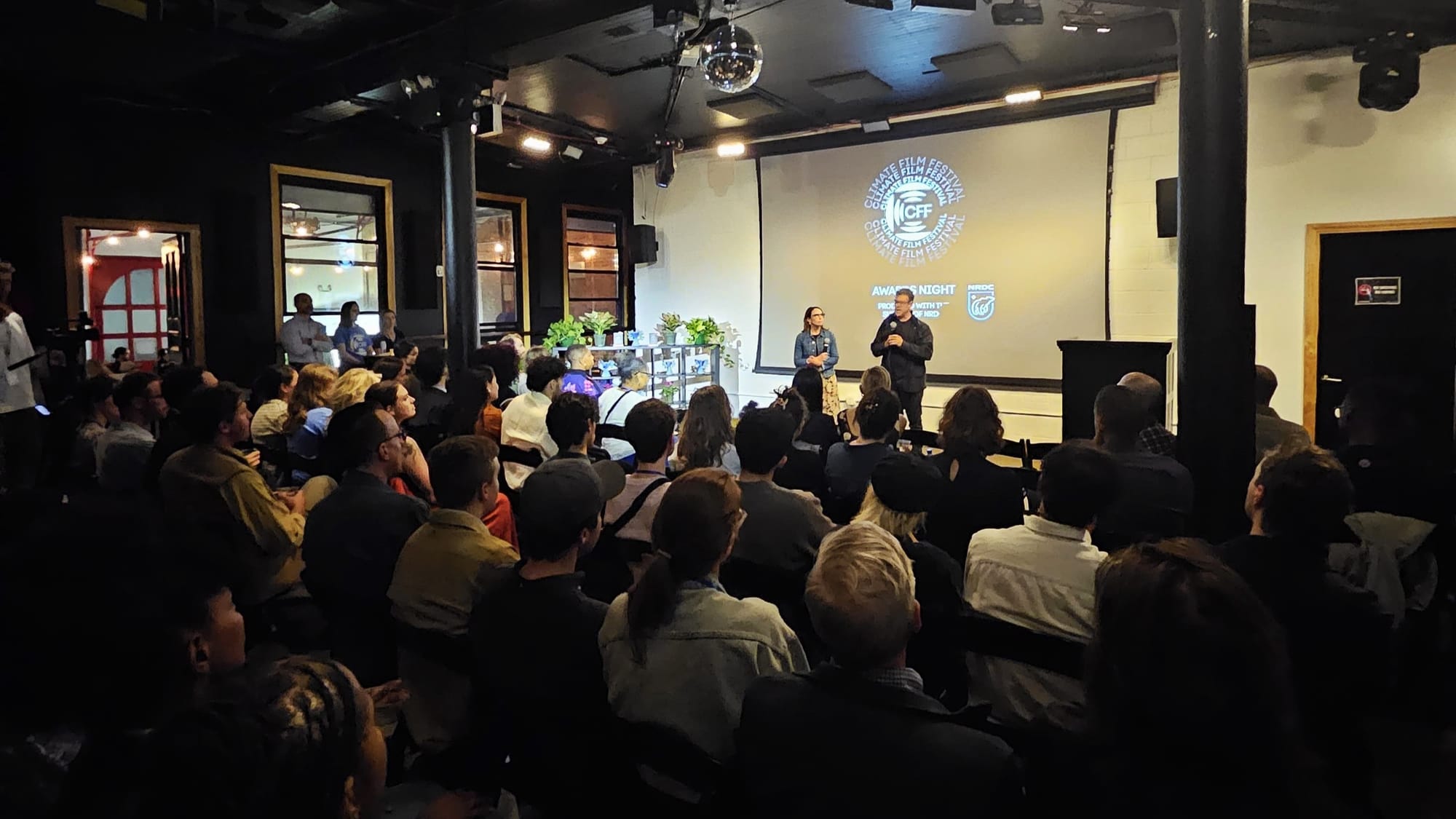
MONDAY (9/22)
The film festival was over, but this year, the CFF organizers had tacked on a whole other full-day event called the Narrative Change Summit, giving more stages for perspectives on climate storytelling to be aired. I luckily had not signed up to actually run this part, so I got to enjoy it as an audience. The most impactful session for me was the last one, called “Films from the Frontlines - Stories that Lead to Climate Action” and hosted by the NAACP. It included a conversation between Gloria Walton of The Solutions Project, filmmaker Traci A. Curry, and Abre' Conner, Director of the Center for Environmental and Climate Justice at the NAACP. Much of the discussion centered around Curry’s recent docu-series, Hurricane Katrina: Race Against Time.
It was invigorating to hear about the effect of storytelling in such a concrete way for a population of people most adversely affected by racist and classist policies here in the United States. It’s one thing to worry theoretically about disadvantaged populations, but it’s another to be in the room struggling with them to find ways forward. Two things were brought up: 1) We’ve got to believe in and build up local communities in the face of government failure; 2) We need to get our own stories out there because in them, we are victors and visionaries, not victims.
TUESDAY (9/23)
While some Columbia classes had declared a vacation day for Climate Week, the two that didn’t bookended my entire Tuesday. At 8:40 am, I was in a lecture hall taking copious notes on disaster risk reduction. At 4 pm, I was in a different lecture hall taking copious notes on the physics of wind force and weather patterns. The six-ish hour rest period in-between got completely sucked up doing the homework that all the “vacation day” classes had given us in lieu of actually attending. Nothing quite helps hit home how much homework you have than trying to complete it all in one six-hour block... and failing.
WEDNESDAY (9/24)
Two events on Wednesday, two very different ends of the climate work spectrum. The first was a panel by Columbia’s Center on Global Energy Policy about the role of AI in the energy transition. I would characterize most of the people on there as the “Abundance” set—folks so “energized” by the fact that we have cheap enough climate tech now that what gets them built is less important than that they are built. Concerns, for instance, about the environmental impact of data centers, are a “distraction” from the fact that we will be seeing “unprecedented efficiencies” once AI is in play. Any regulation towards these industries, they claimed, would make us “lose to China.” (OH BOY, MORE ON THAT LATER).
The second event took place across the street from the United Nations and included international grassroots organizations run by women fighting for a seat at the negotiating table. This included indigenous leaders from Oklahoma and Brazil, climate justice advocates for the Black diaspora, and people trying to stop all fossil fuel investment starting yesterday. The one key takeaway was that you can’t trust corporations, and corporatized countries, to create fair and unexploitative systems. They will always default towards capital capture and colonization. How lucky I was to have seen an example of that earlier that day.
THURSDAY (9/25)
I hosted my own event on Thursday! About a month ago, I’d reached out to CINGS to ask if they wanted to do another climate event (we’d done one together in April), and they’d already booked a space! I then went searching for speakers and came across another guy who wanted to organize something on the exact same day! It was something like kismet. We ended up getting six speakers to talk about multinational corporate sustainability and climate tech investment across the United States and China.
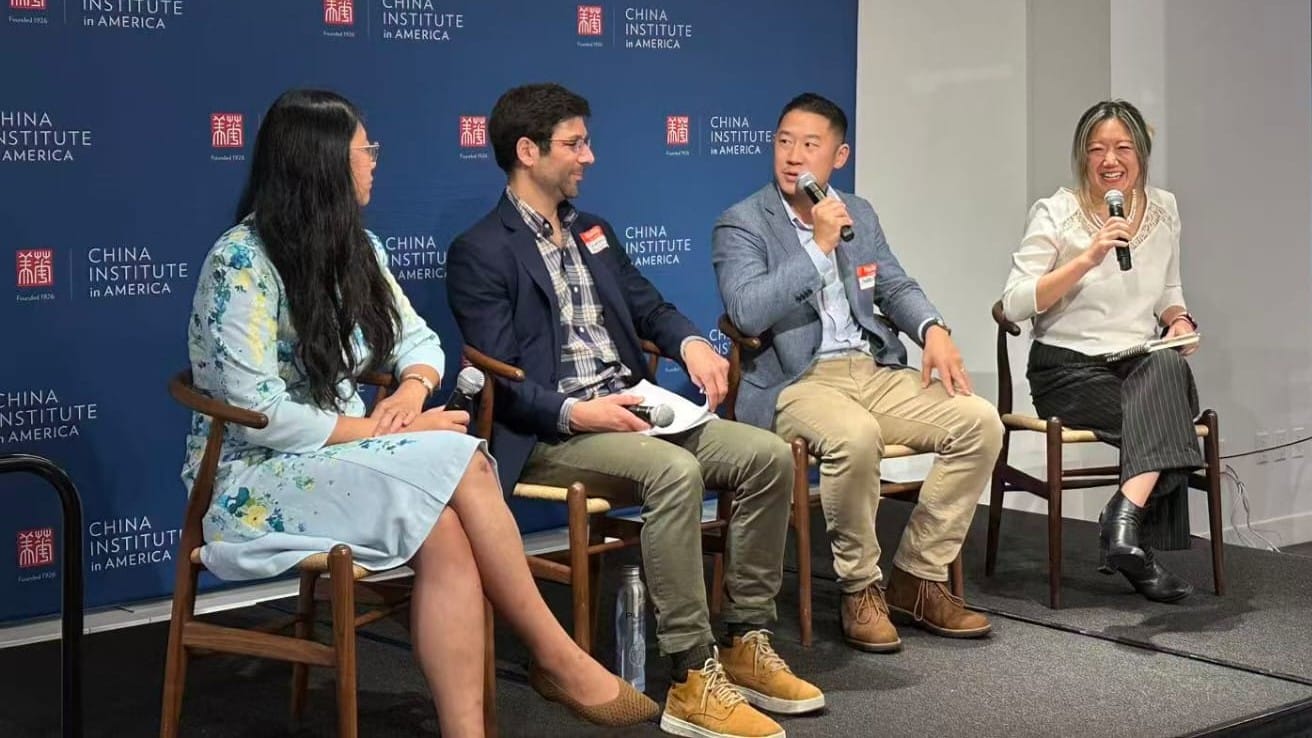
I summarized my thoughts on it on LinkedIN:
🌏 If you care about the global energy transition, you must care about China. 🌏
The good news? From the experience of our panelists, the Chinese side is actually open and eager for collaboration.
The sobering news? The American side seems reluctant to dedicate the effort to explore it.
My own event highlighted this gap: of the fellow Climate School students who signed up (thank you for the support!), almost all who showed up were already Chinese nationals. Throughout the week, when I attended other energy transition events, China was constantly mentioned—but overwhelmingly as a *challenge* to overcome, not a *partner* to engage.
This worries me deeply. More than any climate denier, even one as major as a world leader, this will hurt the future of the American climate zeitgeist. Young China Watchers was founded in a time when learning about China didn't feel politically fraught or niche. Especially in terms of climate and the energy transition, it simply CANNOT be now.
FRIDAY (9/26)
There’s a podcast called Sing for Science, where musicians engage with scientists. It was doing a live episode at Columbia, featuring the dean of our Climate School and a guy who fronts a band I’ve never heard of that apparently sells out Madison Square Garden. They both talked about how excited they were for AI. The musician talked about having a four-hour conversation with Glenn Beck looking for anything in common, and finally finding something in energy security. I probably should’ve taken more notes, but the whole event left a bad taste in my mouth. I will never pinpoint the exact reasons I left bored and angry except that it felt like everything wrong with climate change discourse and milquetoast liberalism.
I got to vent some steam at our Climate Justice discussion session, the last class that didn’t vacay this week. I ranted about how an unjust climate transition was already happening, and we could find its foot-soldiers in this very school. How could we hold in our minds the contradictions of caring about the UNFCC’s mandate of “differentiated responsibility” and call-out of colonization on one side, and have our own professors completely turn a blind eye to the one industry that is absolutely embarking on modern day colonization, Big AI, just because it could be a useful tool? Giving words to it got my blood boiling.
—
Wow, this turned out to be a lot longer than I meant for it to be - obviously I’ve got a lot of thoughts on what I’ve seen, it seems — so I’ll end it here. TL;DR - Climate Week was really fun, but really underscored some big and concerning issues in the climate space, even when we don’t take into account the Orange Man making a mess of things.
🪢related threads
- Leave it to Ta-Nehisi Coates to explain to Ezra Klein why his insipid op-ed in the New York Times was such a slap in the face to everyone who actually cares about... people. The whole conversation has been posted on Youtube.
- But that's really all the time I want to give to that. Here's a palate cleanser instead – the social media managers of the National Park Service, who are still holding on and making cute comical campaigns to remind us to care about animals, nature and the environment. [Marketing Brew]

✨something to enjoy
Speaking of chunky, I've gotten really into watching food videos on Youtube lately, and my algorithm has been delivering me a lot of stuff from these lads at Fallow. Something about them being actual chefs, the cheery but down-to-earth British accents (love that Northern roundness), and the pacing of watching them dish knowledge and create dishes has just been extremely comforting.
🗨️a final quote
If you are silent about your pain, they will kill you and say you enjoyed it
-- Zora Neale Hurston
Stalk me on Social Media
Instagram | TikTok | LinkedIN | Twitter | Goodreads | Spotify

